| Listing 1 - 10 of 12 | << page >> |
Sort by
|
Book
ISBN: 9028901280 9789028901285 Year: 1979 Volume: 24 Publisher: Antwerpen Uitgeverij De Nederlandsche Boekhandel
Abstract | Keywords | Export | Availability | Bookmark
 Loading...
Loading...Choose an application
- Reference Manager
- EndNote
- RefWorks (Direct export to RefWorks)
#KUPV:EC --- Vertelkunst: Vlaamse: Nederlandse --- Dutch literature --- Kortverhalen --- C6 --- literatuur --- literatuuronderzoek --- Didactics of Dutch --- Didactics of secundary education
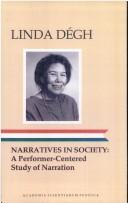
ISBN: 0253316839 9514107470 9514107489 9780253316837 9789514107474 9789514107481 Year: 1995 Volume: 255 Publisher: Helsinki: Suomalainen tiedeakatemia,
Abstract | Keywords | Export | Availability | Bookmark
 Loading...
Loading...Choose an application
- Reference Manager
- EndNote
- RefWorks (Direct export to RefWorks)
"What distinguishes folklorists from representatives of related disciplines who do similar things - go to the field, collect intentional data and subject them to rigorous analysis and interpretation - for diverse disciplinary purposes? Folklorists are unique in their study of folklore for its own sake, as the folk creates, adapts, recreates stories, songs, dances and proverbs. The folklorist observes personal creativity as individuals shape traditional materials, assisted by a critical audience and sanctioned by a tradition-minded community." "The twenty essays in this book, divided into four sections, represent the author's ideas, theories and methodological approaches to folk narrative. The first makes the case for narrator-orientation as a field-ethnography-based humanistic approach; the second introduces the narrator's personality and Weltanschauung as key to his/her motivation and art; the third discusses the intricacies and dynamics of story-transmission and dissemination; and the fourth presents case studies that illustrate Linda Degh's method of analysis of narrative performance. She focuses on individual creators of variants that link up in processes of narrative development leading to dissemination, and the formation of types and subtypes. She shows how much more this method can reveal of the nature of folklore."--Jacket.
Art de conter. --- Contes. --- Conteurs. --- Folklore --- Folklore. --- Mondelinge literatuur. --- Narration --- Storytellers. --- Storytelling. --- Tales --- Tales. --- Vertelkunst. --- Performance. --- Aspect social. --- History and criticism. --- Storytelling --- Storytellers --- History and criticism --- Performance
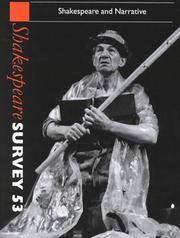
ISBN: 0521781140 9780521781145 0521023971 9780521023979 Year: 2000 Volume: 53 Publisher: Cambridge: Cambridge university press,
Abstract | Keywords | Export | Availability | Bookmark
 Loading...
Loading...Choose an application
- Reference Manager
- EndNote
- RefWorks (Direct export to RefWorks)
Style, Literary. --- Vertelkunst. --- Literatura inglesa (crítica e interpretação) --- Erzähltechnik. --- Shakespeare, William, --- Shakespeare, William. --- Criticism and interpretation. --- Literary style. --- London --- Globe Theatre (London) --- Globe Theatre. --- Literatura inglesa (crítica e interpretação). --- Globe Theatre (London).
Book
ISBN: 2256910873 9782256910876 Year: 2005 Volume: 3 1779-1784 Publisher: Paris: Lettres modernes Minard,
Abstract | Keywords | Export | Availability | Bookmark
 Loading...
Loading...Choose an application
- Reference Manager
- EndNote
- RefWorks (Direct export to RefWorks)
Dumas, Alexandre [père] --- Dumas, Alexandre, --- Criticism and interpretation --- Literature; 19th century; Criticism --- Narration. --- Roman. --- Style littéraire. --- Vertelkunst. --- Criticism and interpretation. --- Critique et interprétation. --- Dumas, Alexandre, - 1802-1870 - Criticism and interpretation --- Dumas, alexandre (1802-1870) --- Critique et interprétation --- Dumas, Alexandre, - 1802-1870
Book
ISBN: 9789004288133 9789004289512 9004288139 9004289518 Year: 2015 Volume: 384 Publisher: Leiden: Boston: Brill,
Abstract | Keywords | Export | Availability | Bookmark
 Loading...
Loading...Choose an application
- Reference Manager
- EndNote
- RefWorks (Direct export to RefWorks)
Ancient Greek hymns traditionally include a narrative section describing episodes from the hymned deity's life. These narratives developed in parallel with epic and other narrative genres, and their study provides a different perspective on ancient Greek narrative. Within the hymn genre, the place and function of the narrative section changed over time and with different kinds of hymn (literary or cultic; religious, philosophical or magical). Hymnic Narrative and the Narratology of Greek Hymns traces developments in narrative in the hymn genre from the Homeric Hymns via Hellenistic and Imperial hymns to those in the Orphic tradition and in magical papyri, analysing them in narratological terms in order to place them in the wider context of ancient Greek narrative literature. Contributors are: Ewen Bowie, Michael Brumbaugh, Nicola Devlin, William D. Furley, Miguel Herrero de Jáuregi, Anne-France Morand, Ivana Petrovic, Nicholas Richardson, Susan A. Stephens, and Athanassios Vergados --
Hymns, Greek (Classical) --- Narration (Rhetoric) --- Hymnes grecs anciens --- Narration --- History and criticism. --- Histoire et critique --- Homeric hymns --- History and criticism --- Hymnen. --- Grieks. --- Vertelkunst. --- Hymnes homériques --- Narrative (Rhetoric) --- Narrative writing --- Rhetoric --- Discourse analysis, Narrative --- Narratees (Rhetoric) --- Inni omerici --- Homērikoi hymnoi --- Hymni Homerici --- Hymns, Greek (Classical) - History and criticism
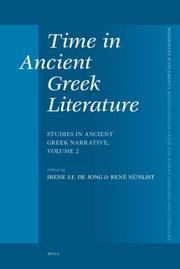
ISBN: 9789004165069 9004165061 9786611937317 1281937312 9047422937 9789047422938 Year: 2007 Volume: 291 2 Publisher: Boston Brill
Abstract | Keywords | Export | Availability | Bookmark
 Loading...
Loading...Choose an application
- Reference Manager
- EndNote
- RefWorks (Direct export to RefWorks)
This is the second volume in a series of volumes which together will provide an entirely new history of ancient Greek (narrative) literature. Its organization is formal rather than biographical. It traces the history of central narrative devices, such as the narrator and his narratees,time, focalization, characterization, and space. It offers not only analyses of the handling of such a device by individual authors, but also a larger historical perspective on the manner in which it changes over time and is put to different uses by different authors in different genres. The present volume deals with time: changes in the order of events (analepsis versus prolepsis), the speed of narration (events may be recounted scenically or in the form of a summary), and frequency (events may be recounted once, repeatedly, or not at all).
Greek literature --- Time in literature. --- History and criticism. --- Littérature grecque --- Temps --- Histoire et critique --- Dans la littérature --- Littérature grecque --- Temps dans la littérature --- Time in literature --- History and criticism --- Histoire et critique. --- Dans la littérature. --- Bellettrie. --- Grieks. --- Tijd. --- Vertelkunst. --- Griechische Literatur --- Zeit --- Zeit. --- Griechische Literatur. --- Greek literature - History and criticism. --- Literature & literary studies --- Literary studies: classical, early & medieval
Book
ISBN: 9075697554 9054872942 9789054872948 9789075697551 Year: 2001 Volume: 7 Publisher: Nijmegen Vantilt
Abstract | Keywords | Export | Availability | Bookmark
 Loading...
Loading...Choose an application
- Reference Manager
- EndNote
- RefWorks (Direct export to RefWorks)
Waar mensen zijn, ontstaan verhalen. Er is geen samenleving, geen cultuur en zeker geen literatuur denkbaar zonder vertellingen. In de afgelopen decennia doken heel wat nieuwe, vaak verrassende verteltheorieën op, maar in het Nederlandse taalgebied kregen die nauwelijks of geen aandacht. Vertelduivels begint met een bespreking van klassieke concepten als plot & story en van theoretici als Franz Stanzel en Dorrit Cohn. Vervolgens komt de structuralistische verhaaltheorie van Gérard Genette en Mieke Bal aan bod. Hoe nieuwe theorieën deze klassieke benaderingen hebben gecorrigeerd, demonstreert Vertelduivels daarna in een uitgebreid hoofdstuk over de ‘postklassieke narratologie’. Deze eerste systematische verkenning voor het Nederlandse taalgebied toont het belang van de postmoderne verhaalanalyse en van diverse andere postklassieke benaderingen. Alle theorieën worden steeds concreet verduidelijkt aan de hand van twee korte teksten van Charlotte Mutsaers en Gerrit Krol. Dat Vertelduivels breed en helder is opgezet, bewijst het feit dat er een Engelse vertaling van is gemaakt bij de University of Nebraska Press. Herman & Vervaeck namen die gelegenheid te baat om hun boek te herzien en te actualiseren. Voor iedereen die geïnteresseerd is in het analyseren en schrijven van verhalen.
82-3 --- 82-3 Proza. Fictie. Narratologie --- Proza. Fictie. Narratologie --- Criticism --- Psycholinguistics --- Fiction --- Epiek --- Verhaalaspecten --- Literatuurwetenschap --- Structuralisme --- 82-3 Fiction. Prose narrative --- Fiction. Prose narrative --- Verhaalaspect --- Structuralistische taalkunde --- literatuur --- scenario --- scenario's --- 82 --- narratologie --- Analyse du discours narratif --- Critique littéraire --- Criticism - 20th century --- Letterkunde --- Vertelkunst --- Nederlandse letterkunde
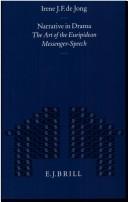
ISBN: 9789004094062 9789004329126 9004094067 9004329129 Year: 1991 Publisher: Leiden ; New York : E.J. Brill,
Abstract | Keywords | Export | Availability | Bookmark
 Loading...
Loading...Choose an application
- Reference Manager
- EndNote
- RefWorks (Direct export to RefWorks)
This book, consisting of three self-contained studies, deals with the Euripidean messenger-speech. The first study concerns the form of the messenger-speech, which is that of a first-person narrative, and the consequences of this form. The second study analyses the messenger's style of presentation. In the third study the place and function of the messenger-speech within the play is discussed. Although scholars have dealt with the messenger-speech before, there is no single, up-to-date work of reference available. The present study aims at filling this void, while making use of analytical tools deriving from narratology and drama-theory. Eight appendices are added, which provide the reader with complete lists of phenomena discussed in the main text. Often considered transparent and self-explanatory, the messenger-speeches are now shown to be both complex and subtle texts.
Analyse du discours narratif. --- Grieks. --- Klassieke oudheid. --- Messagers --- Messengers in literature. --- Mythology, Greek, in literature. --- Narration (Rhetoric) --- Narration (Rhetoric). --- Narration. --- Rhetoric, Ancient. --- Rhétorique antique. --- Speech in literature. --- Toneelstukken. --- Tragedy. --- Vertelkunst. --- Dans la littérature. --- History --- Euripide, --- Euripides --- Euripides. --- Personnages. --- Style. --- Characters --- Messengers. --- Technique. --- To 1500. --- Narration (Rhetoric) - History - To 1500. --- To 1500
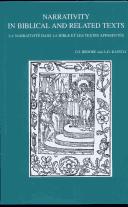
ISBN: 9058670686 9042908777 2877235041 9789058670687 9789042908772 9782877235044 Year: 2000 Volume: 149 Publisher: Leuven: Leuven university press,
Abstract | Keywords | Export | Availability | Bookmark
 Loading...
Loading...Choose an application
- Reference Manager
- EndNote
- RefWorks (Direct export to RefWorks)
Seventeen innovative studies are collected in this volume which has been produced under the aegis of the Centre for Biblical Studies, University of Manchester, and L'Institut des sciences bibliques, Université de Lausanne. The majority of the studies engage with narrative through providing insightful working examples. Building on the many contributions of recent narratological research, for the most part the studies in this collection avoid the technical language of narratology as they present fresh insights at many levels. Some essays focus more on the implied author, some on the implied reader or hearer, and some on the way particular messages are constructed; some of the studies consider how author, message and reader are all interconnected. There are several creative proposals for refining genre definition, from law and wisdom to gospel and apocryphal writings. Some studies highlight the way in which narratives can contain ethical, religious, and cultural messages. Sensitivity to narrative is also shown by some contributors to expose in intruing ways the redactional processes behind the final form of texts. Students of narrative in the ancient world will find much to consider in this book, and others engaged with literary studies more generally will discover that scholars of the worlds of the Bible and Late Antiquity have much to offer them.
Bible --- Bijbel --- Narration in the Bible --- Apocryphal books (New Testament) --- Criticism, Narrative --- 22.015 --- Academic collection --- Bijbel: literaire kritiek; authenticiteit; bronnenstudie; Formgeschichte; Traditionsgeschichte; Redaktionsgeschichte --- Narration dans la Bible --- Apocryphal books (New Testament). --- Narration in the Bible. --- Vertelkunst. --- Bijbel. --- Apocriefen. --- Narration dans la Bible. --- Narrativität. --- Kongress. --- Bible studies --- Bible. --- Apocryphes (Nouveau Testament) --- Bibel. --- Critique narrative --- Critique de la forme --- Congrès. --- 22.015 Bijbel: literaire kritiek; authenticiteit; bronnenstudie; Formgeschichte; Traditionsgeschichte; Redaktionsgeschichte --- Bible studies. --- New Testament apocryphal books --- Antico Testamento --- Hebrew Bible --- Hebrew Scriptures --- Kitve-ḳodesh --- Miḳra --- Old Testament --- Palaia Diathēkē --- Pentateuch, Prophets, and Hagiographa --- Sean-Tiomna --- Stary Testament --- Tanakh --- Tawrāt --- Torah, Neviʼim, Ketuvim --- Torah, Neviʼim u-Khetuvim --- Velho Testamento --- Ba-yon Tipan --- Bagong Tipan --- Jaji ma Hungi --- Kainē Diathēkē --- New Testament --- Nouveau Testament --- Novo Testamento --- Novum Testamentum --- Novyĭ Zavet --- Novyĭ Zavi︠e︡t Gospoda nashego Īisusa Khrista --- Novyĭ Zavit --- Nuevo Testamento --- Nuovo Testamento --- Nye Testamente --- Perjanjian Baru --- Dhamma sacʻ kyamʻʺ --- Injīl --- Narration in the Bible - Congresses. --- Apocryphal books (New Testament) - Criticism, Narrative - Congresses.
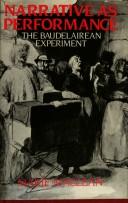
ISBN: 0415006643 0415006635 9780415006644 9780415006637 Year: 1988 Publisher: London: Routledge,
Abstract | Keywords | Export | Availability | Bookmark
 Loading...
Loading...Choose an application
- Reference Manager
- EndNote
- RefWorks (Direct export to RefWorks)
By returning to the roots of story-telling in physical, personal interaction, Marie Maclean gives a new dimension to narrative theory. She sees narrative not just as act but as interplay and enactment. What are the expectations and obligations of story-telling? What drives the audience in the story and the audience of the storytelling? What drives the audience in the story and the audience of the story? What are the power relations of narrators and narrates? How do we trace the working of desire and lack of gender and exclusion? In what way do tellers, characters, and audience relate to narrative space? -- Back cover.
Baudelaire, Charles --- Narration (Rhetoric) --- Reader-response criticism --- Technique --- 82-31 --- 840 "18" BAUDELAIRE, CHARLES --- 82-3 --- Reader-oriented criticism --- Reception aesthetics --- Criticism --- Reading --- Narrative (Rhetoric) --- Narrative writing --- Rhetoric --- Discourse analysis, Narrative --- Narratees (Rhetoric) --- Roman --- Franse literatuur--19e eeuw. Periode 1800-1899--BAUDELAIRE, CHARLES --- Proza. Fictie. Narratologie --- -Technique --- Reader-response criticism. --- Narration. --- Esthétique de la réception. --- Technique. --- Vertelkunst. --- History --- Baudelaire, Charles, --- 1800-1899 --- Literature --- Narrative --- 1800-1899. --- Narration (Rhetoric). --- 82-3 Proza. Fictie. Narratologie --- 840 "18" BAUDELAIRE, CHARLES Franse literatuur--19e eeuw. Periode 1800-1899--BAUDELAIRE, CHARLES --- 82-31 Roman --- Baudelaire-Dufaÿs, Charles Pierre, --- Bodler, Sharlʹ, --- Бодлер, Шарль, --- Būdlīr, --- Baudelaire, Charles Pierre, --- Baudelaire, Pierre Charles, --- Dufaÿs, Charles Pierre Baudelaire-, --- Bodler, Shara, --- Bodler, Şarl, --- Śārla Bodaleẏāra, --- Bodaleẏāra, Śārla, --- Bōntlair, K., --- Bodlir, Sharl, --- Bodler, Sh. --- Bōdorēru, Sharuru, --- Μπωντλαίρ, Σαρλ, --- באדלער, טש --- בודליר, שארל, --- בודליר, שר̀ל --- בודלר, שארל, --- בודלר, שרל, --- بودلير, شارل, --- ボードレールシャルル, --- בודליר, שרל --- Baudelaire, Charles Pierre --- Baudelaire, Charles. --- 82-3 Fiction. Prose narrative --- Fiction. Prose narrative --- Baudelaire, Ch. --- Baudelaire-Dufaÿs, Charles Pierre --- Bodler --- Bodler, Sharlʹ --- Бодлер, Шарль --- Būdlīr --- Baudelaire, Pierre Charles --- Dufaÿs, Charles Pierre Baudelaire --- -Bodler, Shara --- Bodler, Şarl --- Śārla Bodaleẏāra --- Bodaleẏāra, Śārla --- Bōntlair, K. --- Bodlir, Sharl --- Bōdorēru, Sharuru --- C. B., --- B., C., --- Baudelaire, Charles, - 1821-1867 - Technique --- Baudelaire, Charles, - 1821-1867
| Listing 1 - 10 of 12 | << page >> |
Sort by
|

 Search
Search Feedback
Feedback About UniCat
About UniCat  Help
Help News
News